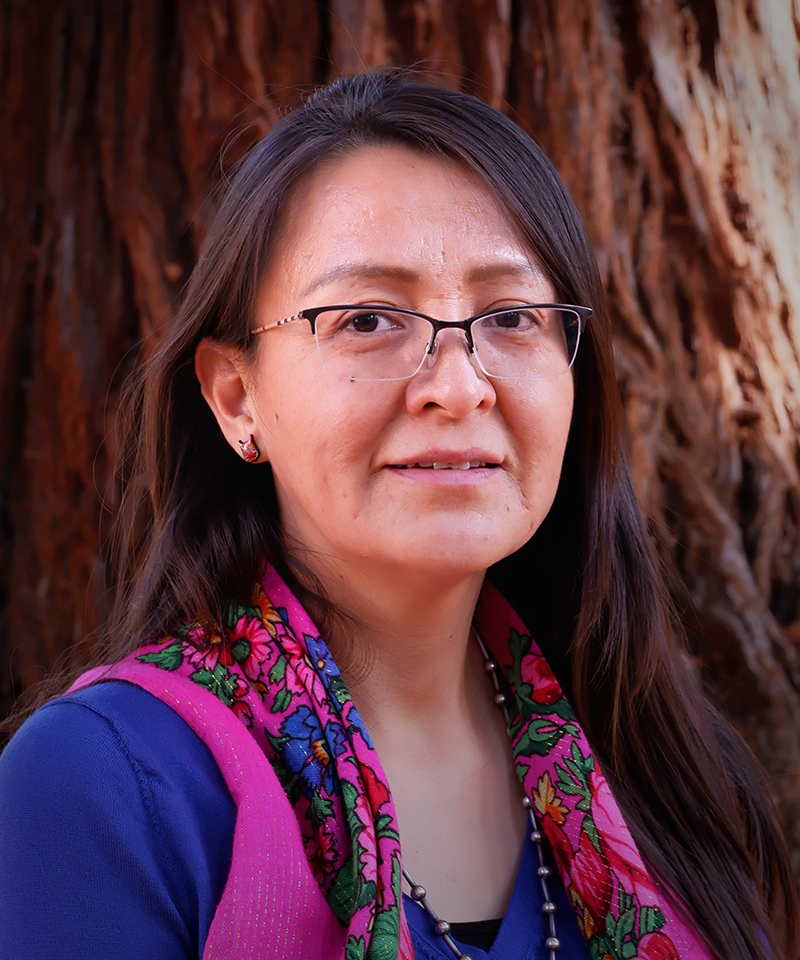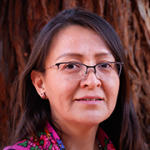Dawn A. Yazzie is a part-time Early Childhood Mental Health Consultant (ECMHC) on the Navajo reservation in Arizona; and also a Technical Assistance Specialist with the Center of Excellence for Infant and Early Childhood Mental Health Consultation. Dawn has experience in providing mental health consultation to early care and education centers, and home visitors on the Navajo reservation. Dawn also provides presentations on her work as an ECMHC on the Navajo Nation. Dawn has a Master of Arts degree in Counseling Psychology from Northern Arizona University in Flagstaff, AZ. She has also recently earned a certificate from the Harris Institute for Clinical Infant-Toddler Mental Health and Family Practice program.
ED: How did you begin your career in early childhood?
I have always loved children! And young children have always gravitated to me. So when I was working on my Master’s degree in counseling psychology, I wanted to have an internship that focused on working with children. In my internship, I was placed with a counselor who had a strong background in working with infants and toddlers and their families and was an infant toddler mental health therapist. It was like a breakthrough to me! I believe that everyone that goes into counseling needs to understand infant mental health because it helps you understand how we unfold as human beings in our mental health and social-emotional development.
After I graduated, I went back to the Navajo reservation and went to work at a local tribal community school and then later at Head Start. I had to oversee the contracts Head Start had with folks who were hired to provide mental health support to children and families. I made sure that the Pyramid Model work and mental health consultation were connected within the contracts. At this time in my career I did not know the true meaning of infant and early childhood mental health consultation (IECMHC) and how it looked. At that time, there were 500 staff working in Navajo Head Start and I wanted to make sure they were also getting what they needed to support children’s mental health.
I then had my youngest child. And though my little guy was the youngest of five, he challenged my parenting at every level. I remember using what I learned in my graduate program about infant mental health to help support his development. I realized that I wanted to help young children and the adults in their lives more directly. I went to work for Southwest Human Development as a mental health consultant. All my training came back to me. I have been there for four years now. Providing IECMHC is what I love and want to do. It is where my passion is!
Not only am I able to work with early childhood educators, families, and be among children, but I am able to connect IECMHC with traditional Navajo ways of parenting, using spirituality, our relationship with the environment, and the way we think and talk as a parent to our young children. Traditional Navajo perspectives “consider all levels of influence,” which is also an important concept in IECMHC service delivery.
ED: What efforts have you been involved in to improve the quality of early childhood programs and services?
In my role as an IECMH consultant, I can improve the quality of programs at different levels. Based on the funding model in Arizona, I work in consultation with child care programs, public preschools, and private preschools. I work with adults in these programs so that the can support the child’s social emotional development. Sometimes it is supporting administrative processes and policies to improve quality. For example, there was a program I worked with that had nap time scheduled for one and a half hours regardless of the age of the child. I talked to them about the different amount of sleep that children may need. A toddler may need more sleep than a four-year-old needs. I also talked to them about different children needing different ways to wake up and allowing for kids to transition from a nap to their next activity at their own pace.
I also work with teachers to support individual children they may have concerns with. There was a child in a classroom who was biting others every day, multiple times a day. I worked with the staff to develop a positive behavior support plan. We problem solved together and talked about when the child was biting. The teachers realized that the biting was happening when it was time to transition and during eating. In reflecting on their own behavior, the staff realized that they had a lot of small transitions within activities, so they slowed down the class schedule to meet the children where they were, or went at the children’s pace. The children in the class became more relaxed and the child’s biting stopped. The teachers were also concerned about the child’s development because they thought that her behavior was regressing. They learned that the child had recently experienced a loss of a parent. So we talked about how they could support her attachment. The child began to make gains developmentally so that her skills were back in the typical range. When it was time for her to transition to another classroom, we made sure to develop a transition plan for her and engage the new teachers in supporting the transition.
By working with administrators and supporting staff, I can help them be more aware of how to support all children’s mental health and social-emotional development. This reduces children being expelled or suspended from programs. When teachers change their practice for one child, it can change how they interact with all children and the quality of the classroom improves. The teacher I worked with who had the little one that was biting, now has children in her class from the child welfare system. This teacher now knows how to stabilize them and support their social-emotional development. You can see the children have more secure attachments and are more independent. Being able to support staff in developing their own skills in working children is what I love about IECMHC.
ED: What are some of the challenges you have experienced in your work and what strategies have you tried to overcome them?
To be an IECMH consultant, you go where the child is — to their home, their child care or preschool. In rural areas, especially on Navajo reservations, this can be a lot of driving. Sometimes six hours a day, which can be very tiring. Additionally, you have to work in large systems and programs, with directors that are in systems that are sometimes not adaptable to planning how to bring staff together for consultation or professional developmental. Systems may be focused on meeting learning standards and ensuring assessments are administered, but not enough time is spent on thinking about staff development and how to help them meet children’s needs. Teachers need time to process children’s behavior and reflect on their practice and how they could make changes. You need to educate and support administrators in thinking through different ways to bring staff together. Help them understand that early childhood is different than the K–12 system and they may need to change their approach of providing in-service to teachers.
With Navajo administrators, I help them translate concepts of IECMHC and trauma-informed care into understanding and recapturing our traditional practices. With the history of assimilation and boarding schools, we lost a lot of our protective factors in the traditional culture and I see IECMHC as a way that we can recapture and relearn those traditional practices. This includes self-care, knowledge of self, and knowing triggers and thinking about “all levels of influence.” As an IECMH consultant, we think about how we support others. If you are observing in a classroom and see a teacher yell, we just can’t jump in. We need to think about how to support the teacher and talk to the teacher, which can be difficult at times. One of the basis of IECMHC is self-reflection, which can help you overcome many challenges.
ED: What suggestions do you have for others interested in improving early childhood services and programs?
If you don’t have knowledge of IECMHC, pursue it! IECMHC has been around for 20 years and it is spreading. The Center of Excellence for Infant and Early Childhood Mental Health Consultation has a number of tools for states, tribes, and programs to help them get IECMHC started. There are states that are now using IECMHC in elementary schools, pediatric care, child welfare systems. Bringing it into different areas and finding ways to support its implementation, gives it new life.
Individuals can also find resources at the Center to learn about IECMHC. They can learn about the principles of IECMHC and practices around attachment, trauma-informed care, nurturing relationships, and meeting children where they are at. As an educator or parent, the self-reflection and self-care skills you learn through IECMHC can help in caring for children.
Blog articles provide insights on the activities of schools, programs, grantees, and other education stakeholders to promote continuing discussion of educational innovation and reform. Articles do not endorse any educational product, service, curriculum or pedagogy.



